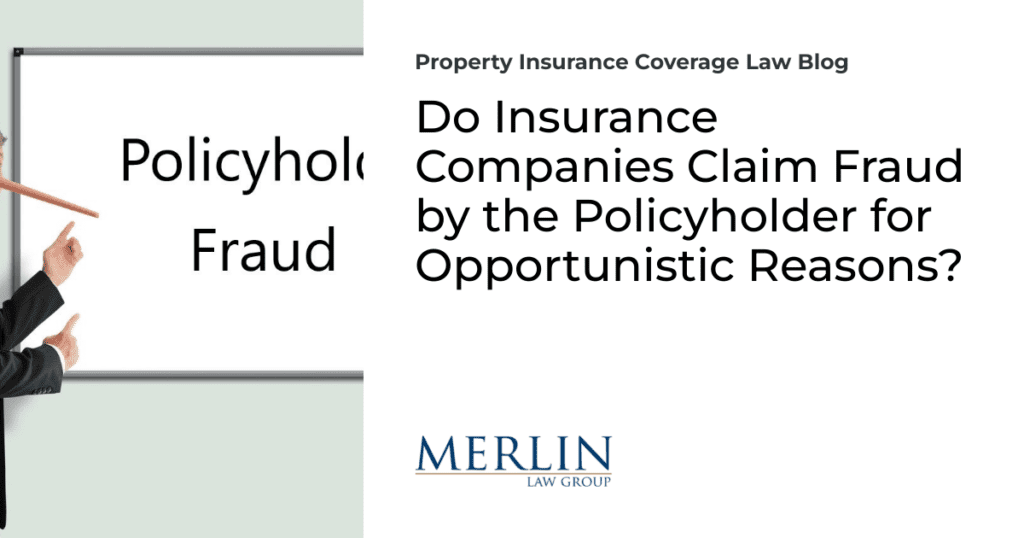Do Insurance Companies Claim Fraud by the Policyholder for Opportunistic Reasons?

A recent law review article, Policyholder Misrepresentation in Insurance Claims,1 written by insurance law professor Jay Feinman raised the issue of insurance companies wrongfully claiming fraud as a claims practice. Personally, I am sick and tired of the overuse of fraud allegations by insurance companies and their propagandists. Based on the significant amount of fraud claimed by insurance defense counsel and insurance company lobbyists, insurance seems to be a product more addictive than opioids because it turns a great deal of an otherwise innocent public into criminals.
Feinman argues that exaggerated and wrongful claims of fraud by insurers to escape liability often go unpunished:
When a loss occurs, insurer agency arises because policy terms and the surrounding law that measure the company’s performance are vague and difficult to enforce. Also, the insured usually is poorly situated to effectively monitor the company’s performance in handling the claim. The insurance policy does not specify in much detail the insurer’s duties in processing a claim. A typical HO-3 homeowners’ policy, for example, only requires the company to pay claims within sixty days of agreement or adjudication and to participate in appraisal; otherwise, it delineates no duties concerning the processing of a claim. Indeed, it is difficult to specify the insurer’s duties because they necessarily rest on vague concepts such as promptness and reasonableness. As expressed in the Model Unfair Claims Settlement Practices Act, for example, a company must ‘adopt and implement reasonable standards for the prompt investigation and settlement of claims arising under its policies.’ The vagueness of the company’s defined responsibility, the substantial advantage in information, and the expertise that the insurer possesses create an inherent difficulty in monitoring the performance. Even if the insured can detect insurer opportunism, its ordinary remedy is only to receive the benefits it already was entitled to under the policy; in most jurisdictions, broader remedies are available only if the insured can prove intentional or reckless misconduct.
Moreover, the company has some incentive to act opportunistically and not pay a claim or pay less than it actually owes. The company that denies payment of a claim in whole or in part increases its profits. The company that only delays payment of a claim increases its investment income and thereby increases its profits. Market competition, reputational effects, and administrative regulation arguably fail to provide effective checks on opportunistic behavior. A company that delays paying claims or denies valid claims in whole or in part conceivably could suffer a negative reputational effect, and reputation is an important element in consumer purchases of insurance. But claim practices are not a major determinant of satisfaction or purchasing behavior, particularly relative to price.
The form of insurer opportunism in the claim process that is particularly relevant to the false swearing rule is the assertion of fraud by the insured as a reason for not paying a claim. The false swearing rule gives power to that assertion, and therefore, the rule itself potentially becomes a tool for opportunism. In many jurisdictions, the severe consequences of a finding of false swearing—denial of an entire claim for any nontrivial incidence of fraud—raise the stakes considerably. Therefore, with respect to false swearing in the claim process, agency and opportunism are present on both sides.
Each of the rationales for the false swearing doctrine also relates to insurer opportunism. Opportunism by insurers constitutes an egregious form of breach of the insurance contract not only of its express terms requiring payment of what is owed but also of the obligation of good faith. The risk of insurer opportunism imposes inefficient monitoring costs on insureds, costs that many insureds cannot bear at all. It violates moral and legal strictures, and insurer fraud imposes costs on members of the pool whose claims are not paid, just as the prevention of that kind of fraud benefits the entire pool by ensuring that the claim process works better for all claimants.
Feinman makes the point that preventing fraudulent claims is legitimate. He merely argues that exaggerated claims of fraud by insurers as a claims practice requires a response in the law. There needs to be a remedy against those fraudulently claiming fraud against policyholders:
The insurer’s and the pool’s interest in preventing fraudulent claims are legitimate but so are the insured’s and the pool’s interest in preventing fraudulent claims of fraud. Reconciling the possibility and effects of opportunism by the insured and by the insurer in formulating the boundaries of the false swearing rule requires consideration of the relative risk and severity of each form of opportunism. How likely are insureds to control relevant information and at what expense could insurers discover it? How likely are insurers to deny claims opportunistically? If an insurer asserts fraud, how likely will an insured effectively contest the insurer’s position?
…
The false swearing rule was developed to address the problems of agency and opportunism by an insured in the claim process. That problem is best understood within the insurance claim process with broad perspective, a perspective that recognizes the possibility of agency and opportunism by an insurer as well as by an insured. From that perspective, the rule needs to be properly defined, applied, and supplemented by other doctrines to balance the legitimate interests of insureds and insurers.
Doug Quinn of the American Policyholders Association correctly says that all insurance fraud is wrong. Professor Feinman simply makes an additional point that insurance company fraudulent claims of fraud are wrong as well.
Thought For The Day
One of the most troubling things about the term ‘fake news’ is that it has become a force field against accusations you don’t like.
—Kevin Young
1 Jay M. Feinman. Policyholder Misrepresentation in Insurance Claims. 29 Conn. Ins. L.J. 28 (2022).



